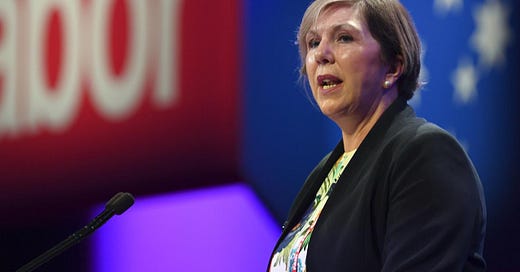The Federal Government’s decision last week to deny Qatar Airline’s request for increased flights to key Australian cities, sure took on a life of its own.
Catherine King, the Minister for Aviation and Transport’s reason to sign off against Qatar’s request, was tied to the strip search of five Australian women at Hamad Airport.
The decision has left many throughout the aviation industry, diplomats, as well as many Australians bewildered.
As much as the incident was unquestionably serious and requires diplomatic attention, King’s decision is the epitome of "politics gone mad."
There’s no doubt the strip search of the five Australian women was a violation of their human rights - however, the magnitude of King’s decision seems disproportionate to the incident.
The invasive searches were a breach of human rights and warranted diplomatic action, but putting an essential economic relationship on the line might be overreach.
That’s not to downplay the gravity of the incident but it questions whether such a significant decision is the right channel for airing these grievances.
The denial has sparked outrage and condemnation more so than what the Government had anticipated.
And that may have been borne from a place of naive thinking that would have been more support from the public than not, and a misguided belief Australians would appreciate Qantas was being protected.
Well, the PM and King sure got that wrong.
Maybe the Feds were still of the belief Qantas was a quality run airline held in high regard by Australians.
That may have been the case Prime Minister a lifetime ago, before Alan Joyce began piloting the Flying Kangaroo into a kamikaze dive.
While the decision might seem routine on the surface, industry experts and economists are questioning its wisdom.
Many are suggesting this could go down as one of the most significant missteps in Australian aviation history.
So much for competition, economic prudence and enhanced diplomacy and building relationships.
Just ask Foreign Affairs Minister, Penny Wong, what she may have discussed in her recent phone conversation with Qatar’s Prime Minister, Sheikh Mohammed bin Abdulrahman bin Jassim Al-Thani
You wouldn’t be hard pressed to think she was both embarrassed and coy about the debacle and King’s decision.
Qatar Airways is one of the world's leading airlines, offering extensive global coverage, and connecting major economic hubs. Its desire to increase flights to Australia isn't just a boon for the airline but could also benefit the Australian economy in myriad ways.
Increased flights would have resulted in more tourism, better international connectivity, and an influx of business travellers—each contributing to various sectors of the economy.
International relations often require a delicate balance, and aviation deals are no exception.
But to link the denial of flight increases to a non-aviation issue, King has risked setting a precedent that could backfire.
By turning down Qatar Airways, Australia indirectly strengthens competing hubs in cities like Singapore, Hong Kong, and Dubai.
Travellers from Europe and North America looking for convenient connections to Australia might prefer these alternative routes, causing a shift of traffic and revenue away from Australian airports.
Qatar has rapidly grown into an influential player in international politics and economics.
The Australian government's decision could strain diplomatic relations between the two.
And in a world where international alliances are crucial, this move could have repercussions beyond the aviation sector.
As global travel is recovering from the effects of COVID, airlines are seeking to rebuild their networks.
Qatar Airways’ proposal came at a time when Australia could use all the help it can get to rejuvenate its travel and tourism sectors.
Thwarting Qatar’s plans might slow down Australia’s post-pandemic recovery pace, compared to other nations that are more welcoming of such international collaborations.
Internationally, the immediate interpretation may suggest that fewer flights from Qatar Airlines would benefit Australian carriers like Qantas, and yet, the reality may not be so straightforward.
The complex web of codeshares, partnerships, and joint ventures in international aviation means Australian airlines could also have gained from Qatar’s expanded presence.
More flights typically mean more choices and competitive prices for consumers.
With Qatar now being kept at bay, Australian passengers lose the chance to benefit from more flexible scheduling and potentially lower ticket costs.
It’s especially relevant given Qatar is known for its premium service and could have offered a compelling value proposition for Australian travellers.
Australia’s long been seen as a pro-business and open-market economy; however, the decision almost sullies its reputation among international investors and corporations, particularly in the Middle East.
Perception matters, and a move that appears protectionist can have far-reaching implications for foreign investments in various sectors, not just aviation.
Its unquestionable not o taccept that the Australian government needed to send a strong message to Qatar, but is stifling economic opportunities for Australians the best way to go about it?
According to sources, the denial was made without wide consultation from stakeholders within the aviation industry or experts in diplomatic relations.
The rush to make such a significant decision could indicate that it was driven more by political considerations than by sound policy analysis.
By taking a hardline stance, King appears to be making a statement in line with an increasingly polarised international political landscape.
However, it raises the question of whether this is effective diplomacy or just politics gone mad.
The Australian government’s decision to reject Qatar Airline’s expansion plans may be a multi-faceted mistake.
From economic growth and international relations to consumer choice and sustainability, the implications are far reaching.
Only time will tell how this decision plays out in the long term, but as of now, it seems set to become a cautionary tale in Australian aviation history and if King was serious, Qatar would be banned altogether.
Frequency makes no difference and there’s a sense of hypocrisy with King’s decision.




